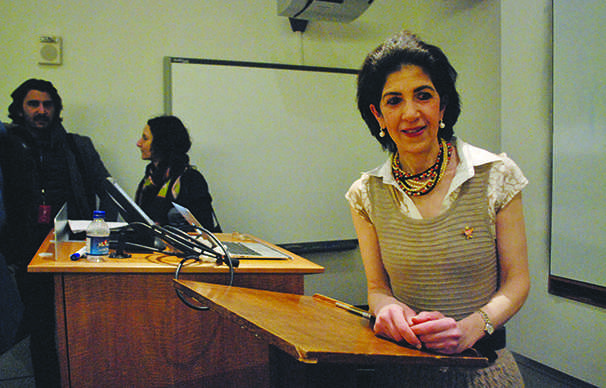Renowned physicist discusses significance of Higgs boson
March 6, 2014

Fabiola Gianotti, one of the top physicists at CERN, the largest lab in the world for particle physics, gave a talk at NYU on March 5 about the impact of discovery of the Higgs boson on human lives. Gianotti was the former spokesperson for Atlas, one of the experiments associated with the Large Hadron Collider.
The talk was given as a part of the NYU “Science on the Square” series meant to highlight science at the university. A team of 15 NYU professors, students and researchers, known as the NYU Experimental Particle Physics group, worked under Gianotti’s leadership to analyze data produced by the LHC.
The existence of the Higgs boson was first theorized by Nobel Prize-winning physicist Peter Higgs. The Higgs boson is particularly important because interaction with the Higgs gives particles their mass.
“We should care because if elemental particles [have] no mass, atoms would not exist,” Gianotti said. “This means that the universe would not exist, and we would not be here. We are what we are because elementary particles have a mass.”
Kyle Cranmer, professor of physics, who was among the many scientists working on the project, said the technology developed in the search for the Higgs boson has since been applied in other fields.
“Historically, these kinds of advances have had unintended consequences that have transformed our way of life,” Cranmer said. “Most famously, the Web was invented at CERN to help physicists communicate. All of those practical applications are great, but the significance of the Higgs is at the level of basic research. It’s the root of the tree.”
Over 3,000 scientists from 38 different countries were a part of the Atlas project. Gianotti said the environment at CERN naturally brings people together and helps to overcome strained international political relationships.
“I think it is because we are all driven by passion. Passion for physics. Diversity is a strength to do better research, to have better ideas, to be in a more stimulating environment,” Gianotti said.
Gianotti said student involvement in research at CERN is important. More than 50 percent of the researchers at CERN are under 35.
“They have been very important on all levels, to do the analysis and eventually discover the Higgs boson,” Gianotti said. “They have very brilliant ideas. The leadership [at CERN] does not come from the hierarchy, the leadership comes from ideas. This is a research society, so if the younger student has the right idea, the collaboration follows.”
Stern freshman Jessica Guo said she was inspired by Gianotti.
“I thought she was incredible,” Guo said. “She was technical, but not to the point of being unintelligible, and yet funny and engaging and inspiring all at once. The fact that she is a woman and also a major leader in the field of particle physics is amazing.”
A version of this article appeared in the Thursday, March 6 print edition. Valentina Duque Bojanini is a contributing writer. Email her at [email protected].


























































































































































